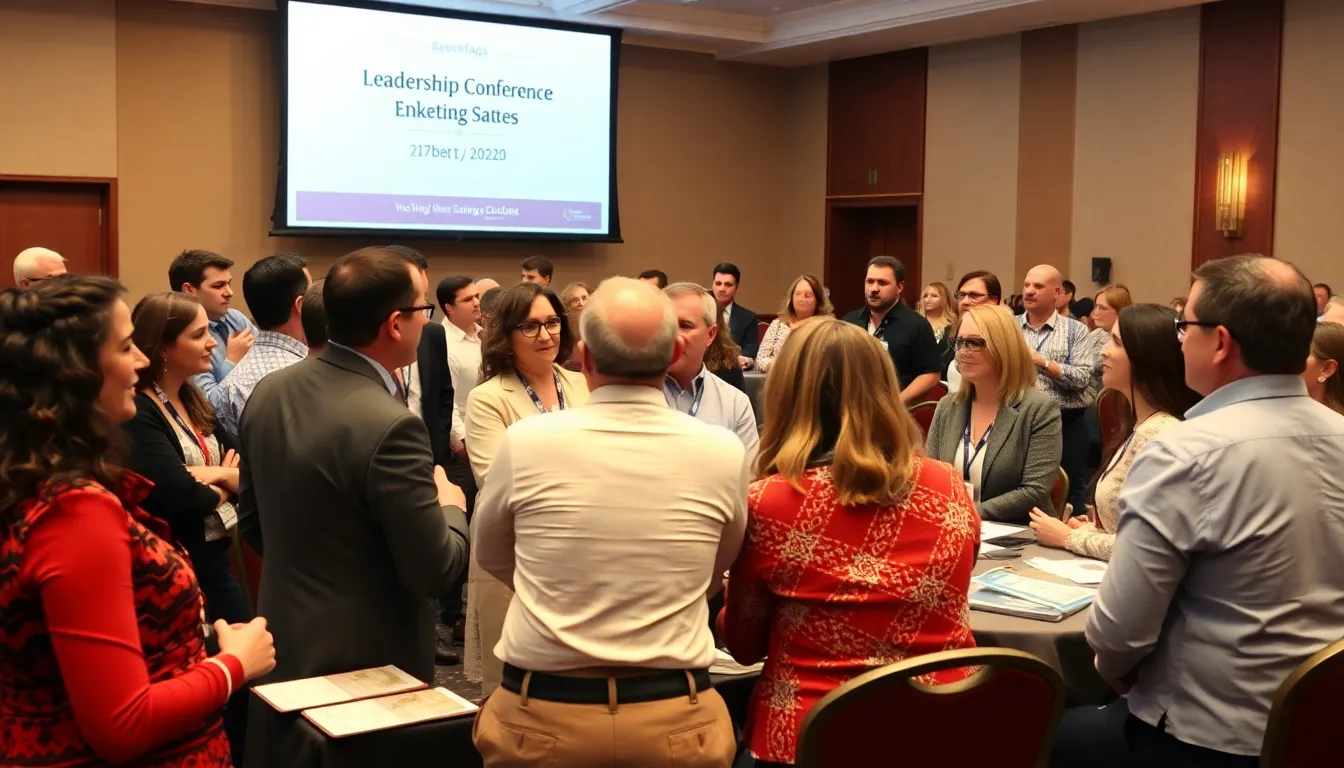Table of Contents
ToggleLeadership events are like the secret sauce for professional growth. They’re not just another excuse to swap business cards and nibble on stale croissants. These gatherings pack a punch, bringing together visionaries, innovators, and those who can actually pronounce “synergy” without breaking a sweat.
Overview of Leadership Events
Leadership events play a crucial role in professional advancement. These gatherings attract participants from diverse industries, all seeking to hone their leadership skills. Engaging sessions often feature expert speakers who share insights and strategies for effective leadership. Networking opportunities abound, allowing attendees to connect with peers and industry leaders.
Workshops serve as interactive spaces where participants can practice skills in real-time. Panel discussions facilitate dialogue around current trends and challenges in leadership. Personal development remains a focal point for many, with events often designed to motivate and inspire attendees.
Statistics show that 70% of leaders credit conferences with enhancing their leadership skills. The exchange of ideas during these events fosters innovation and collaboration. Many attendees leave with actionable takeaways that can be implemented in their organizations.
Mentorship opportunities frequently arise, connecting emerging leaders with experienced professionals. Such relationships can benefit both parties, as seasoned leaders share wisdom and newcomers bring fresh perspectives. Certification programs found at some events can also provide valuable credentials in the leadership space.
Diverse formats exist, ranging from intimate workshops to large international conferences. Each format caters to different needs, ensuring that a broad range of participants find value. Effective planning elevates the experience, making it memorable and impactful.
Types of Leadership Events

Leadership events come in various formats, each serving distinct purposes. Attendees can gain valuable insights and skills through these diverse offerings.
Conferences and Summits
Conferences and summits attract large numbers of participants, often bringing together industry leaders and innovators. These events frequently feature keynote speakers who share their expertise and experiences. Networking opportunities abound, allowing attendees to forge essential connections. Topics discussed range from emerging trends to strategic leadership techniques. Participants often leave with actionable strategies to apply in their organizations. The scale of these events fosters an atmosphere of collaboration and inspiration, encouraging attendees to engage actively in conversations.
Workshops and Seminars
Workshops and seminars focus on practical skill development, providing hands-on learning experiences. Facilitators guide participants through interactive sessions that emphasize real-world applications. Attendees engage in group activities and discussions, enhancing their understanding of leadership concepts. These environments promote personal growth and foster relationships among participants. Content often covers specific skills, such as effective communication or conflict resolution. Many find these intimate settings conducive to deeper conversations and strong connections, equipping them with tools for future challenges.
Key Benefits of Attending Leadership Events
Attending leadership events offers numerous advantages for personal and professional growth. Participants can gain valuable insights and connect with industry leaders.
Networking Opportunities
Networking opportunities abound at leadership events. Attendees interact with peers, mentors, and industry influencers, fostering relationships that can open new doors. Conversations at these events often lead to collaborations or mentorship arrangements. Building a robust network enables access to diverse perspectives and resources. Individuals often find that connections made during these gatherings prove beneficial long after the event concludes.
Skill Development
Skill development ranks among the top benefits of leadership events. Workshops and seminars frequently focus on essential leadership skills such as effective communication and conflict resolution. Participants engage in hands-on experiences that promote practical learning. Expert-led sessions provide tailored insights to address specific challenges. Attendees often leave with actionable strategies and enhanced capabilities, prepared to tackle future leadership challenges. Developing these skills contributes significantly to their overall leadership effectiveness and career progression.
How to Choose the Right Leadership Event
Selecting the right leadership event involves several key factors. First, consider the objectives that you aim to achieve. Identifying specific goals, such as networking opportunities, skill development, or exposure to industry trends, helps narrow down choices.
Evaluate the format of the event. Conferences and summits cater to broader discussions with prominent speakers, while workshops focus on practical and hands-on skills. Analyze which format aligns better with personal learning preferences.
Research the speakers and facilitators. Engaging with respected industry leaders enhances the value of the event. Investigating past presenters and their topics provides insight into the kind of expertise available at the event.
Look into participant demographics. Different sectors may be represented at these events. Meeting people from diverse backgrounds enriches the experience and opens avenues for collaboration.
Consider the event’s location and timing. Accessibility plays a crucial role in attendance. Opt for events that fit within personal schedules to maximize participation.
Review testimonials and feedback from previous attendees. Insights from others highlight the strengths and weaknesses of an event. Finding firsthand experiences paints a clearer picture of what to expect.
For those interested in personal development, focus on events with dedicated sessions for leadership growth. Workshops covering topics like effective communication and conflict resolution often provide profound takeaways.
Lastly, prioritize events that offer networking opportunities. Building relationships with mentors or peers can prove invaluable long after the event concludes. Connecting with influential figures can lead to significant career advancements.
Tips for Maximizing Your Experience
Identify objectives before attending a leadership event. Focus on what one aims to achieve, whether it’s networking, skill enhancement, or industry insights. Researching the event format proves beneficial. Conferences offer broad discussions, while workshops prioritize practical skill development.
Engage actively during sessions. Participation often leads to richer experiences and deeper connections with speakers and fellow attendees. Make the most of networking opportunities; introducing oneself to peers and industry influencers can spark future collaborations.
Prepare questions in advance. Thought-provoking inquiries can stimulate meaningful dialogue during Q&A sessions. Follow up post-event with contacts made; sending a quick message reinforces connections and keeps the conversation alive.
Take notes during presentations. Recording key insights helps retain information and creates a valuable resource for later reference. Use social media to share experiences live. Posting insights or tagging speakers boosts visibility and encourages interactions with other attendees.
Evaluate the demographics of participants. Diverse groups enhance discussions and broaden perspectives on leadership challenges. Seek out mentorship opportunities throughout the event. Engaging with experienced professionals often leads to invaluable guidance for emerging leaders.
Prioritize personal development sessions. Dedicated tracks focus on advancing leadership skills and personal growth. At workshops, participate fully in interactive segments to practice newly acquired skills. Ultimately, a proactive approach to these elements leads to a rewarding leadership event experience.
Leadership events are invaluable for personal and professional growth. They foster connections that can lead to lasting relationships and collaborations. By engaging with industry leaders and fellow attendees, individuals gain insights that can transform their approach to leadership.
The diverse formats of these events cater to various needs whether it’s honing specific skills or exploring broader trends. Attendees leave equipped with actionable strategies and a renewed sense of purpose. With careful planning and active participation, leadership events can significantly impact one’s career trajectory. Embracing these opportunities is essential for anyone looking to elevate their leadership journey.




